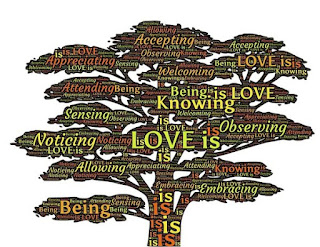 |
| Wonder Woman inspirational power & strength through words ~ art print by Marvin Blaine |
In any case, there's a section in this book that discusses the power of the word on our lives, and our ability to be happy and fulfill our self-chosen destiny thanks to it. This is because "words absolutely do filter and transform experience." For you see, "since words are our primary tool for interpretation or translation, the way we label our experience immediately changes the sensations produced in our nervous systems. You and I must realize that words do indeed create a biochemical effect."
In fact, in Words Can Change Your Brain, Andrew Newberg, M.D. and Mark Robert Waldman state that "a single word has the power to influence the expression of genes that regulate physical and emotional stress." Negative words cause our brain to create fear-inducing, stress-related hormones, while positive words stimulate the frontal lobe of our brain, which is linked to logic and reason. The frontal lobe activation by the positive word(s) will, in turn, activate other parts of the brain, like the parietal lobe (responsible for how you view yourself), and the thalamus (responsible for how you view others and reality), so that we will start feeling better about ourselves, others around us, and basically our whole world.
Robbins used as an example how one of his friends inspired him to start using the word "peeved" whenever he started feeling angry about a situation. Just the use of that word (instead of potentially stronger words like "livid" or "enraged") automatically diffuses the situation emotionally-speaking, and therefore allows him to be open to more ways to solve the problem that's suddenly appeared because he's not flooding his brain and body with stress hormones.
But Robbins doesn't just stop there. Indeed, he posits that not only do the labels we apply to how we feel/what we think alter our emotions (with the goal being that we want to more relaxed and happier beings), but that the greater our vocabulary, the easier it is for us to do so.
To illustrate this point, Robbins mentions a study that had once been undertaken in a prison, where it was found that "when inmates experienced pain, one of the few ways they could communicate it was through physical action--their limited vocabulary limited their emotional range, channeling even the slightest feelings of discomfort into heightened levels of violent anger." So the better you are at labeling your emotions, the better you become at controlling your anger (and potentially your violence), and lessening the degree of the emotions while at the same time heightening the positive one.
In an online class I took (I'm all about self-empowerment these days), the teacher stressed the fact that you can choose to be happy, and the way to do that is to realize that your thoughts--shaped by your words--affect how you feel. So it's very important to use empowering words, ones that will make you feel good about yourself and your world, words of love, and encouragement, and inspiration.
And it works! It truly, really works! I'm not saying that it's always going to be easy, that we won't feel pain or sadness (like I said, we haven't yet "evolved" into machines), but it will certainly skew our life towards the more positive side of things. So my goal (or one of them anyways, but this one's at the top of my list) is to consistently choose to be happy, and build up my vocabulary so I can describe my emotions in more variegated ways.
I'm also hoping this will allow me to become a better writer over time.
So, what word(s) of power would you like to calibrate your life to in the coming weeks, months, or years?
If we want to change our lives and shape our destiny, we need to consciously select the words we're going to use, and we need to constantly strive to expand our level of choice.
~Anthony Robbins
















